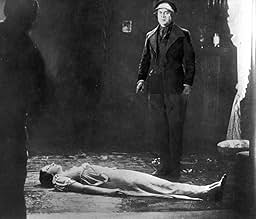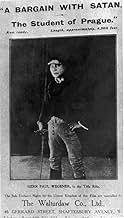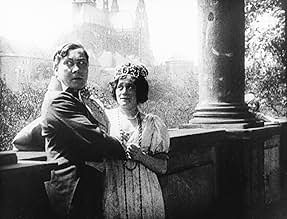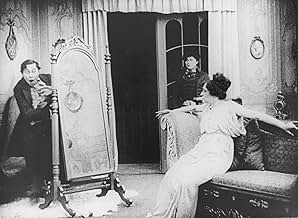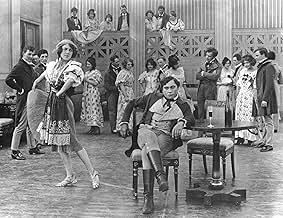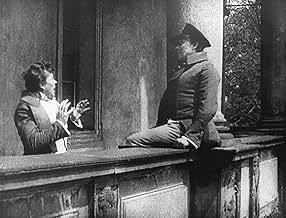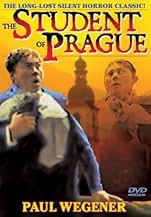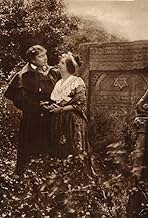Agrega una trama en tu idiomaThe poor student Balduin sells his mirror image to the satanic sorcerer Scapinelli. He falls in love with a countess and tries to win her over. But his mirror image receives a life of its' o... Leer todoThe poor student Balduin sells his mirror image to the satanic sorcerer Scapinelli. He falls in love with a countess and tries to win her over. But his mirror image receives a life of its' own and sabotages Balduin's every move.The poor student Balduin sells his mirror image to the satanic sorcerer Scapinelli. He falls in love with a countess and tries to win her over. But his mirror image receives a life of its' own and sabotages Balduin's every move.
- Dirección
- Guionistas
- Elenco
- Lyduschka, a Gypsy Girl
- (as L. Salmonowa)
- Self - with cap at Belvedere
- (sin créditos)
Opiniones destacadas
Unfortunately, the most cinematic this film gets is the double exposure effects to make Paul Wegener appear twice within scenes. Guido Seeber was a special effects wizard for his day, but he's not very good at positioning the camera or moving it. Film scholar Leon Hunt (printed in "Early Cinema: Space, Frame, Narrative"), however, has made an interesting analysis on this film using framing to amplify the doubles theme: characters being split by left/right, near/far and frontal/diagonal framing of characters and shots. Regardless, the film mostly consists of extended long shots from a fixed position, which is noticeably primitive. Worse is the lack of editing; there's very little scene dissection and scenes linger. None of this is unusual for 1913, but there were more advanced pictures in this respect around the same time, including the better parts of "Atlantis" (August Blom, 1913), "Twilight of a Woman's Soul" (Yevgeni Bauer, 1913) and the short films of D.W. Griffith.
An expanded universal film vocabulary by 1926 would allow for a superior remake. Furthermore, the remake has a reason for the Lyduschka character--other than being an occasional troublemaker and spectator surrogate. Here, the obtrusively acted gypsy lurks around, seemingly, with a cloak of invisibility. I know their world is silent to me, but I assume, with their lips moving and such, that their world would not be silent to them, so how can Lyduschka leer over others' shoulders and not be noticed?
Nevertheless, this is one of the most interesting early films conceptually. Wegener, who seems to have been the primary mind behind it, in addition to playing the lead, would later play the title role and co-direct "The Golem" in 1920--helping to further inaugurate a dark, supernatural thread in German silent cinema.
(Note: The first version I viewed was about an hour long (surely not quite complete) and was in poor condition, with faces bleached at times and such. I'm not sure who was the distributor. I've also since seen the Alpha DVD, which, at 41 minutes, is missing footage present in the aforementioned print and also has fewer and very different title cards, but is visually not as bad. The repetitive score is best muted, though.)
This is fairly primitive stuff, with an immobile camera, stage framing, and zero close-ups or medium shots. There are a number of basic doubling effects used for when Balduin and his evil twin are on screen together that surely wowed audiences of the day. The sets and costumes are fine. I'm not sure this would be of much interest to anyone outside of film historians, though, as it lacks any sense of pacing or even character beyond the most arbitrary.
"Der Student Von Prag" ("The Student of Prague"), is the story of Balduin (Paul Wegener), a student with the reputation of being the best fencer in Prague, but who always find himself with financial troubles. One day, Balduin rescues the beautiful countess Margit (Grete Berger) from drowning in a lake after her horse drop her by accident. Balduin falls immediately in love with her and tries to see her again, but soon he discovers that he'll have to compete with her rich cousin, Graf Von Schwarzenberg (Lothar Körner), who also wants to marry her. Knowing that he can't offer her much, Balduin wishes to be wealthy, and this is where a sorcerer named Scapinelli (John Gottowt) enters the scene. Scapinelli offers Balduin infinite wealth in exchange of whatever he finds in his room. Balduin accepts the proposal, only to discover in horror that what Scapinelli wants is his reflection in the mirror.
Loosely inspired by Edgar Allan Poe's short story "William Wilson" and the classic legend of "Faust", the story of "Der Student Von Prag" was conceived by German writer Hanns Heinz Ewers, a master of horror literature and one of the first writers to consider scriptwriting as valid as any other form of literature. Written at a time where cinema in Germany was still being developed as an art form, "Der Student Von Prag" shows a real willingness to actually use cinema to tell a fully developed story beyond a camera trick or a series of scenes. Like most of the scriptwriters of his time, Ewers screenplay is still very influenced by theater, although "Der Student Von Prag" begins to move away from that style. While a bit poor on its character development (specially on the supporting characters), Ewers manages to create an interesting and complex protagonist in the person of Balduin.
While "Der Student Von Prag" was Paul Wegener's directorial debut and Stellan Rye's second film as a filmmaker, it's very clear that these two pioneers had a very good idea of what cinema could do when done properly. Giving great use to Guido Seeber's cinematography, the two young filmmakers create a powerful Gothic atmosphere that forecasts what the German filmmakers of the following decade would do. Wegener would learn many of the techniques he would employ in his "Golem" series from Seeber and Rye. Despite having very limited resources, Rye and Wegener manage to create an amazing and very convincing (for its time) visual effect for the scenes with Balduin's reflection (played by Wegener too). Already an experienced stage actor at the time of making this film, Wegener directs the cast with great talent and also attempts to move away from the stagy style of previous filmmakers.
As Balduin, Paul Wegener is very effective and probably the best in the movie. It certainly helps that his character is the only one fully developed by the writer, but one can't deny that Wegener was very good in his role as the poor student who loses more than his mirror reflection in that contract. John Gottowt plays the sinister Scapinelli with mysterious aura that suits the character like a glove. Few is said about Scapinelli in the film, but Gottowt makes sure to let us know that he is a force to be feared. The rest of the main cast is less lucky, with Grete Berger being pretty much average as countess Margit, and Lothar Körner making a poor Graf Von Schwarzenberg. However, it must be said that Lyda Salmonova was pretty good in her expressive character and Fritz Weidemann made an excellent Baron Waldis-Schwarzenberg, showing the dignity that Lörner's character should have had.
Considering the movies that were being done in those years in other countries and the fact that its remake (made 13 years after this film) is superior in every possible way, it's not difficult to understand why "Der Student Von Prag" hasn't stood the test of time as well as other early films. The movie's main problem is definitely its extremely low budget, as it resulted in the film being considerably shorter than what Ewers' story needed to be fully developed. This makes the plot feel a bit too vague at times, or even incomplete, as if there was something missing in the narrative (of course, there's also the possibility that the existing print is really incomplete). However, "Der Student Von Prag" is a very interesting early attempt at a complex tale of horror and suspense in film that, while inferior to what other filmmakers were doing at the time, left a powerful impression in history.
As the direct predecessor of the German expressionist movement, it's hard to deny the enormous importance that "Der Student Von Prag" has in the history of German cinema, probably in the history of cinema in general. It may look dated even for its time, but considering the limited resources its director had, it's truly better than most films from that era. As the movie that started Paul Wegener's career, and with that German expressionism, "Der Student Von Prag" is a must see for everyone interested in this slice of film history. 7/10
¿Sabías que…?
- TriviaThis is sometimes considered to be the first horror film ever made.
- Citas
Balduin, a Student: Ruined am I! Procure for me the luckiest ticket in the lottery or a dowered wife.
- Versiones alternativasThere is an Italian edition of this film, included as Bonus Feature, on DVD "IL GOLEM" (1915), re-edited with the contribution of film historian Riccardo Cusin. This version is also available for streaming on some platforms.
- ConexionesFeatured in Fejezetek a film történetéböl: A német film 1933-ig (1989)
Selecciones populares
- How long is The Student of Prague?Con tecnología de Alexa
Detalles
- Fecha de lanzamiento
- País de origen
- Sitio oficial
- Idiomas
- También se conoce como
- The Student of Prague
- Locaciones de filmación
- Hradschin, Praga, República Checa(view of the castle and it's surroundings)
- Productora
- Ver más créditos de la compañía en IMDbPro
- Tiempo de ejecución
- 1h 23min(83 min)
- Mezcla de sonido
- Relación de aspecto
- 4:3
- 1.33 : 1

